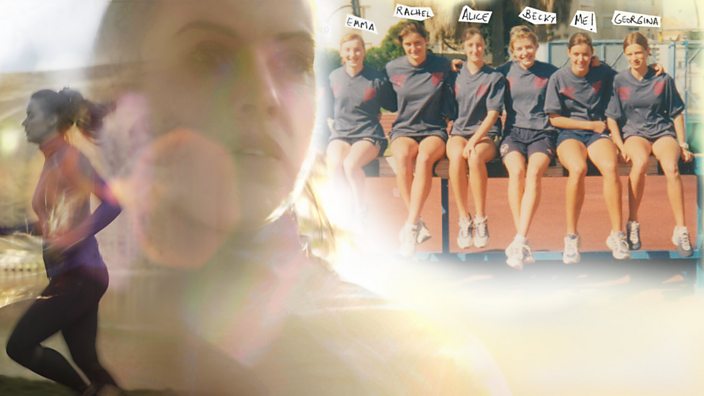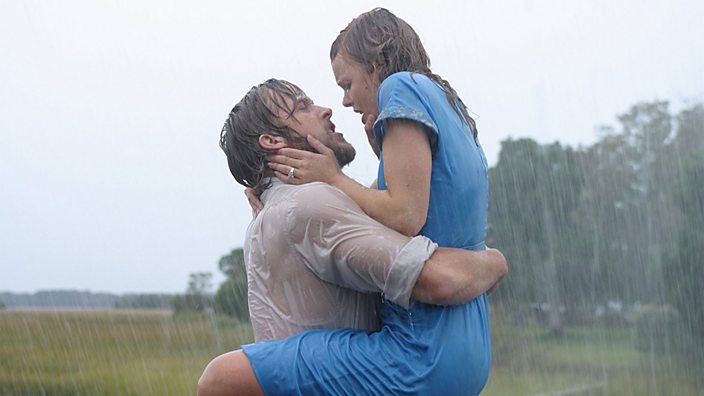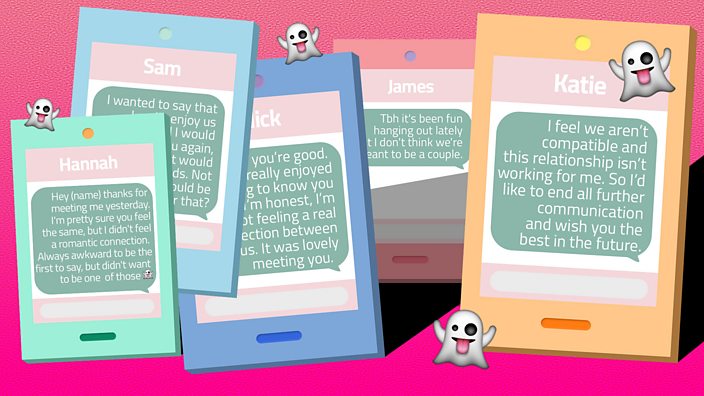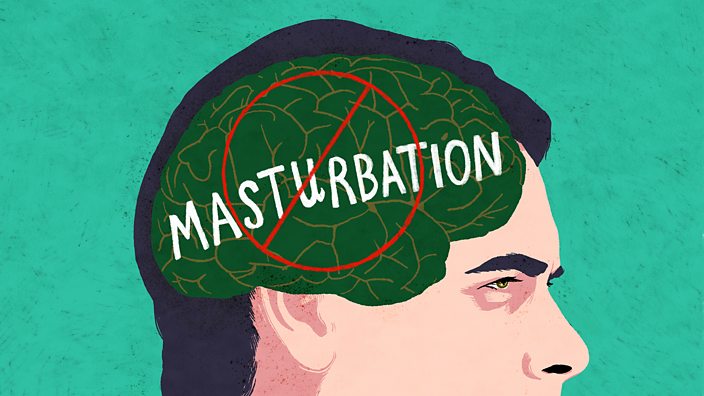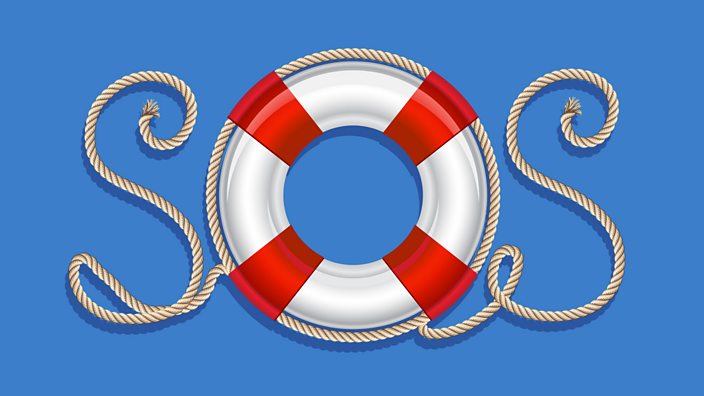 BBC Three / iStock
BBC Three / iStockHow not to die on holiday
These four people had brushes with death while abroad but despite their injuries, they lived to tell the tale
When you hear the word 'holiday' what do you think of? Beaches, palm trees, cheap cocktails – or just a chance to switch off your social media for a few precious days? Holidays can be a blissful disconnect from reality but, when things go wrong, a dream break can quickly turn into a nightmare. Whether it’s a moped crash, a drunken accident or a natural disaster, the risk of a holiday ending in tragedy is a painful reality for several thousand Brits each year.
According to the most recent government figures from 2015-16, 3,606 lost their lives abroad during that period, and 3,319 ended up in hospital, with the largest number of deaths occurring in popular spots for holidaying Brits, like Spain, Thailand and France. While these are substantial numbers, deaths abroad have actually dropped by 40% since 2010.
We hear from four people who had brushes with death while abroad but, thankfully, lived to tell the tale.
Ross, 25: 'My bone was sticking out of my leg'
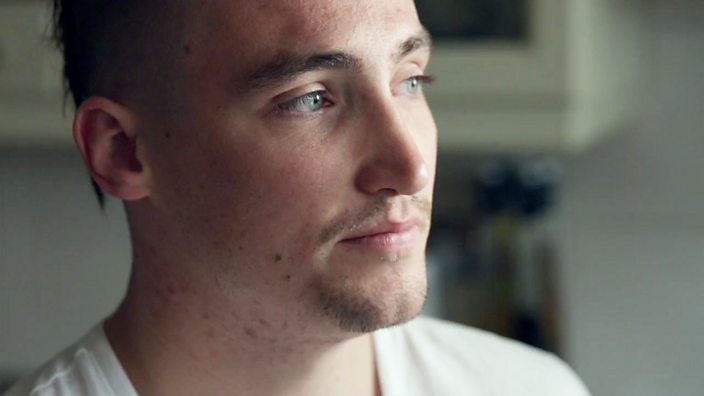 BBC Three
BBC ThreeI decided to go to Thailand after I finished university. The plan was to travel around South East Asia on mopeds. I had probably the best 1,000 miles of my life, travelling up the mountains, seeing wild elephants.
I met Aimie in the hostel we were both staying at. We were going to go to a party out in the jungle on my moped. Aimie didn’t have a helmet as she wasn’t riding her own moped, so I took mine off and gave it to her. I thought it would be fine to drive without a helmet as we were only going up the road.
It was dark out, and difficult to see the road ahead. There was a bend ahead of us, and I couldn’t tell in the poor light how sharp it was. I completely misjudged that left-hand turn and I was thrown off the bike.
The next thing I knew, Aimie was standing over me – I was on my back on the road. I was barely conscious. Aimie asked a passerby to call an ambulance, and I was rushed to hospital. It was then I realised the full horror of what had happened.
My ordeal is frighteningly common. A World Health Organisation report using the latest available data suggests that around 378,000 motorcyclists die worldwide annually.
The searing pain in my leg hit me and I came round, screaming. I saw the bone sticking out of my leg. I was in such agony that they knocked me out. The next thing I remember is waking up to a surgeon telling me I’d have to have my leg amputated. I was devastated. I couldn’t believe what was happening. He didn’t speak much English, so I didn’t fully understand how damaged my leg was.
For nearly four days the surgeon was telling me to have my leg amputated, trying to convince me, and I kept saying no. Little did I know, but I had four infections in the wound, including a flesh-eating one. I spoke to my mum over the phone, and she told me I should listen to them and have my leg amputated to save my life.
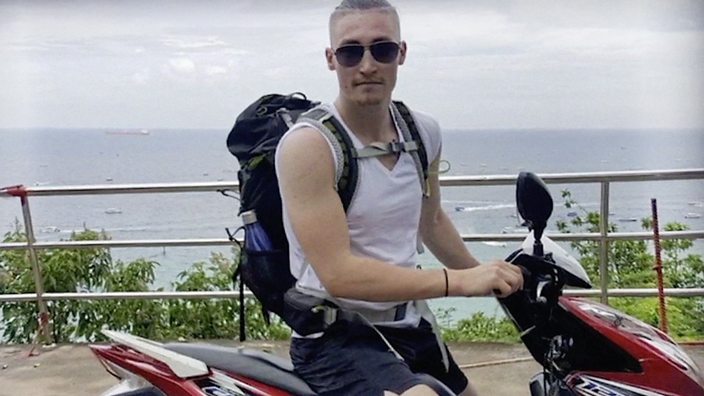 BBC Three
BBC ThreeThings went from bad to worse. I developed sepsis and went into shock and I was having really vivid hallucinations. I thought I was dying – I was thinking of my mum and dad and telling them mentally that I loved them. They arrived after I had the amputation – I was still very ill, but I felt relieved to be alive and seeing them.
My insurance thankfully covered my medical bills, and I was able to move to a private hospital. I had to have another 10cm removed from my leg as the infection was still there. I think I had about 14 surgeries in total and was taking so much medication. I was so depressed, thinking of what my future might be like.
I completely believe that if Aimie hadn’t been travelling with me, I wouldn’t have survived. She was amazing. It has been difficult to accept how much my life has changed – I get sore if I walk for too long, but the physical side is easier to deal with than the mental effects. I feel so guilty for the pain my family have been through.
What’s really helped me is playing wheelchair basketball – I’ve met people who’ve been through even harder things than me, and it’s made me realise I’m not alone.
What the experts say:
If someone is injured in a road accident, call for help immediately and don’t move the person – they may have damaged their spine.
Check they’re breathing, and if they’re not, try and open their airway by putting your thumbs on their cheeks and fingers under their jawbone, and gently lifting. Don’t tilt their neck.
Begin CPR if they’re still not breathing after 10 seconds.
If there’s an open wound, cover it with clean fabric and apply pressure around the wound to reduce blood loss. Loosen any tight clothing, and keep them warm.
Choose a safer mode of transport than a moped – but, if you are going to travel on one, always wear a helmet and cover your arms and legs.
Rhianna, 29: 'Nobody could hear me scream under the snow'
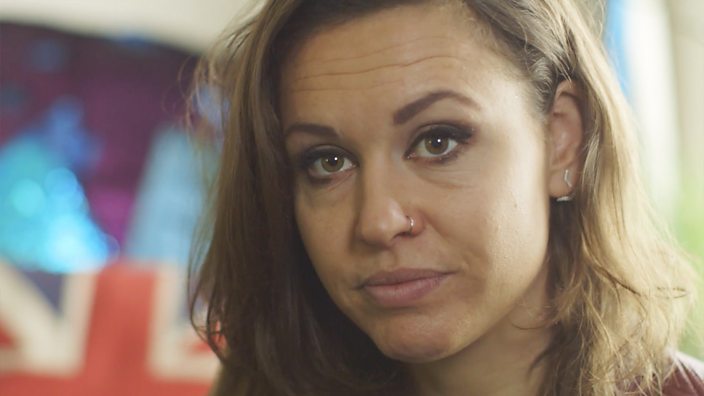 BBC Three
BBC Three“Shit. I’ve really done it this time.”
That was my first thought as I lay trapped under a metre of heavy snow, my body frozen in place after skiing down a perilous off-piste run we’d nicknamed 'Death Valley' because it was prone to avalanches.
I was 22 and working abroad at a ski resort in Austria. I’d finished uni and headed straight to the mountains, ending up in the lively ski village of Ischgl – well known for its parties and nightlife. I got a job with a ski rep company looking after guests, sorting their ski passes and picking them up from the airport. It was a dream come true to have access to those slopes. But, although I was an experienced skier – I grew up doing it – I’d never had any experience of avalanches.
Before the morning of the accident, it had been snowing non-stop for three days. But, that February day, it was sunny and clear with tonnes of fresh snow on the ground – a skier’s dream, really. However, all that fresh snow, which skiers call powder, could be dangerous, too: it was effectively sitting on top of the old snow – not packed in at all – just waiting to slide.
I dragged some friends out of bed and we started skiing. It was my idea for us to venture out onto the dangerous off-piste area because it had the most untouched, light, fluffy powder – looking back it was really stupid to go there.
As we were skiing down, I had a collision with one of my friends and I tumbled, causing a huge wave of snow to crash over me. It kept going and going, with an avalanche of snow around 30 metres across carrying me off down the slope.
When I finally stopped hurtling down the mountain, hundreds of metres from where my friends were, I realised I was frozen in place. Panicked, I screamed out for help. There was no response – then I had the horrifying realisation that they probably couldn’t hear me under such thick, insulating snow. I tried to move but I couldn’t. I was about a metre under and there was literally no space whatsoever to breathe. It was like having a cloth over my mouth.
My first thought was that I might be having one of those dreams where I die – but then I realised it was really happening. I tried to calm myself to conserve oxygen and struggled to reach my phone, which was ringing in my pocket, as my friends tried to call me. But being so deep under meant I couldn’t move and my friends couldn’t hear my phone ringing either.
My sister – my favourite person in the whole world and my best friend – was the last thing I thought of. I remember just letting myself go. I felt the darkness close in and let myself die.
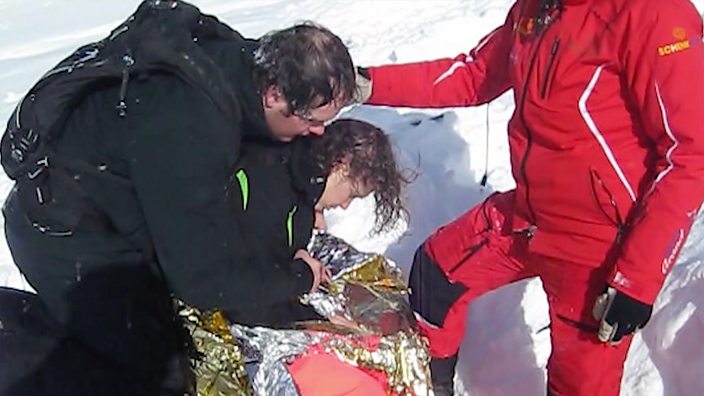 BBC Three
BBC ThreeUp above, my friends were randomly digging as they frantically tried to find me but they didn't know where to search. By chance, after around 13 minutes, they found the back of my leg and pulled me out. Later, they told me my face was pure white and I had dark purple lips.
I wasn’t breathing but, after some emergency CPR from a friend, I eventually woke up. I wasn’t quite sure what was going on – all I knew was that I was incredibly cold. I was in and out of consciousness until the mountain rescue team arrived with a helicopter and took me to hospital.
I was in hospital for three days and then recovering at home in the UK for another three but, after that, I went straight back out and finished my ski season. The avalanche hasn’t put me off skiing but I’m now more cautious going off-piste and, if there’s even the slightest chance I’m going anywhere dangerous, I take proper safety kit including a transceiver (a device that helps locate skiers trapped under snow) and a shovel so that if I needed to I could dig myself out.
It took a long time for me to absorb just how lucky I was. The avalanche risk was high that day and I was skiing without the proper equipment. The avalanche gear I use now is expensive – but what price is your life?
What the experts say:
Avoid skiing off-piste after heavy snow, and always check the avalanche risk. If it's three or more, seriously consider changing your plans.
Being trapped under an avalanche can cause suffocation – before the snow becomes too impacted, make an air pocket by moving your hands in front of your face as you fall.
Call for help immediately if you think someone's trapped, and follow the terrain downwards from the last place you saw them, in the direction of the avalanche flow.
Search for signs of life and dig the person out of the snow when you find them. Give CPR if they're not breathing, and keep them as warm as possible.
Jack, 23: 'I broke every bone in my face'
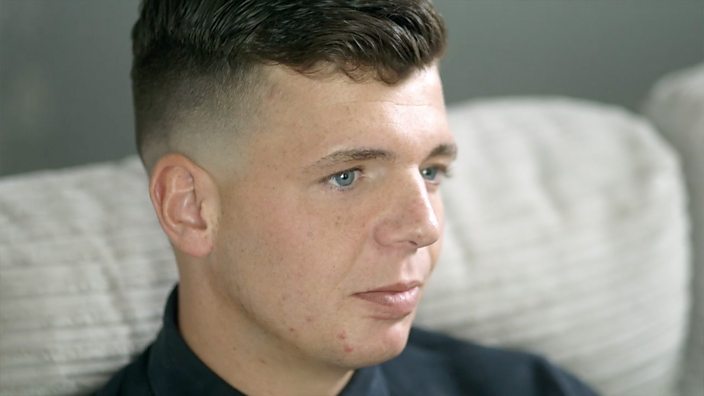 BBC Three
BBC ThreeIt was all fun and games from the get-go. I was going to Magaluf for my mate’s stag do last summer with 20 other guys, and it was shaping up to be a good trip.
It was the start of the four-day holiday so we chilled by the pool, had a few cocktails and played drinking games. Later that night, we went out to the street where all the bars and clubs were, known as the strip. I don’t remember much about the night because of what happened later but I definitely put away lots of cocktails and beer.
Eventually, at around 4am, I walked back to the hotel with my mate who put me in my room. From what I can remember, I went outside onto the balcony for a cigarette and started feeling queasy. I began to throw up and accidentally lunged forward over the railing. I toppled off the second-storey balcony and crashed onto the concrete floor below.
I'm not alone. The Foreign Office told the BBC that, last year, 23 Brits suffered falls in Majorca and Ibiza.
Thankfully, some passersby found me at the bottom and rang the emergency services.
The ambulance team put me straight into an induced coma on the scene to protect my brain. They told my friends they weren’t sure if I was going to make it through the night, and they rang my family to say they should get out there as soon as possible. My brother later said he thought I was dead, and they were just coming to collect my body.
I had a bleed on the brain from the fall, broke every bone in my face, shattered my left pelvis and broke my right wrist. I also snapped my left knee cap clean in half and dislocated my left leg so severely that it could have left me unable to walk for the rest of my life. The doctors were also worried I would never talk again because of how badly my face and jaw was crushed.
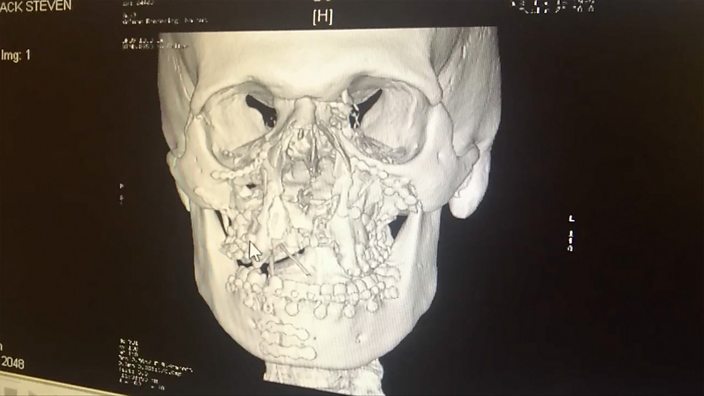 BBC Three
BBC ThreeI don’t remember anything about the fall. My first memory is waking up from the coma about two weeks later. I was confused and didn’t know where I was. After three weeks in hospital, I was flown home to Wolverhampton and it’s been a long, painful recovery process since then. Even things as simple as eating were hard: I couldn’t chew or use my right hand so I had to rely on my dad. Now I have false teeth but I still don’t have any sensation on the left side of my face.
I was in a wheelchair for a long time and missed my mate’s wedding. I’m still waiting for a hip replacement and the pain makes my day job as a ceiling installer difficult. The mental side of my recovery has been a challenge, too. I’ve spent a lot of time talking to my psychiatrist and I’ve learnt that my brain needs time to adjust itself. It’s okay to say I’m not okay.
I know I should have stopped drinking at some point on the holiday and just gone to bed. I could have said to my mates, “I’ll have a few soft drinks, lads.” Ultimately, I’ve tried to take the good from this situation and now I approach life with as much positivity as possible. I’ve stopped smoking and am completely sober, which has been life-changing. I don’t plan on drinking again in the future.
What the experts say:
Avoid balconies if you've been drinking or taking drugs.
If you find someone who's fallen, call an ambulance immediately on 999 if you're in the UK or 112 in Europe.
Don't move the person from the position they've landed in, as they might have injured their spine and moving them could damage it further. Steady their head without moving it.
How Not To Die On Holiday is on BBC iPlayer from 11 August
Evan, 18: 'I never thought about the dangers of the sea'
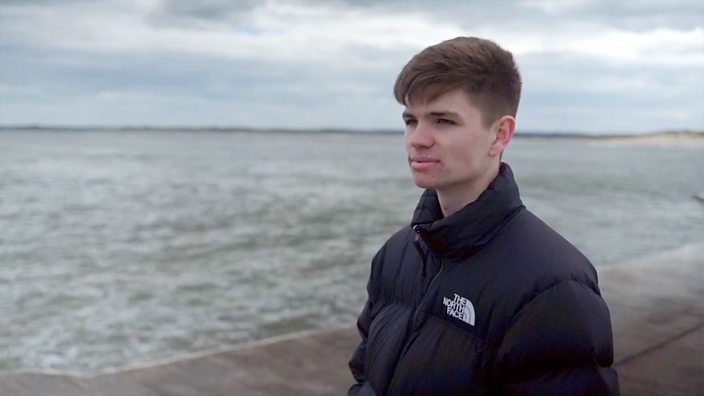 BBC Three
BBC ThreeWhen my friends and I finished our GCSEs in 2017, we went with my dad and cousin up to my family’s caravan in Northumberland. It’s near the beach that I’d been to hundreds of times growing up. A few years ago, my dad bought a paddleboard and some kayaks for us to mess about on. I knew that stretch of beach so well, but I’d never thought about the dangers of the sea.
A couple of days into the holiday, the weather was a bit gloomy but we were still determined to go in the sea. We brought the paddleboard out but it was too choppy to stand on it, so we gave up on that idea and went swimming. Me and two friends went in up to about chest height and, suddenly, two big waves came over us. When I came out of the water, I couldn’t even stand on my tiptoes – I kept having to bounce up from the bottom. That’s when I thought, “Ok, I’ve got to get back to where I was.” I tried to swim forward and I didn’t seem to move – I’d be swimming as hard as I could under the water for about 20 seconds, then I’d come up and see I was further out than when I started. The fear really kicked in then.
My cousin later told me that he saw my head go under, and shouted to our friends to get the coastguard. My dad could see from the beach how much I was struggling and made the call straight away. He's said since that it was like time stood still while I was in the sea.
Rip currents are hard to spot – they’re strong currents that flow from the shore back out to sea, and I was caught right in the middle of one. By luck, my friends managed to escape it, so I was left alone being pushed out to sea. It was getting harder and harder to breathe deeply, my legs were starting to cramp, and I was getting really cold. Shouting for help was just making me more tired. In the midst of my panic, I suddenly remembered a water safety video I’d seen that said to lie on your back. Everything else had failed, so that’s what I did.
I’d been in the water for about 45 minutes at this point. Images of my family, my girlfriend and my friends drifted through my mind – what if I never saw them again? I started taking breaths while floating on my back, willing my energy to return. The choppy waves had washed me further down the coast, and I caught sight of some yachts moored by the pier. Using the last of my energy, I swam towards them – I’d been washed out of the rip current by then by another big wave. I was so exhausted that I couldn’t even climb on deck. I just clung to the mooring rope, hoping someone would help.
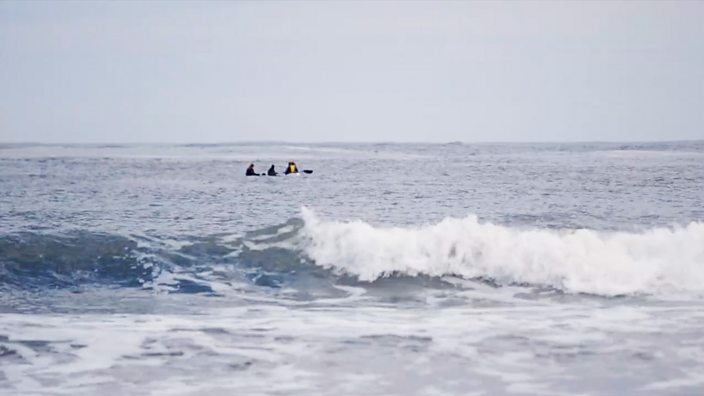 BBC Three
BBC ThreeMy dad had called the coastguard, and I was picked up by a lifeboat and taken to shore where an ambulance was waiting. I had hypothermia, and I’d swallowed some sea water but, after a few hours in the local hospital, I was given the all clear.
What the experts say:
Don't try to swim against a rip current, you'll tire yourself out. Swim to the side, parallel to the shoreline, to get out of it. You can drown in three minutes if you become too exhausted to swim.
Always try and swim on a beach with lifeguards, between the red and yellow flags.
If you spot someone in trouble and there are no lifeguards then call the coastguard.
Don't attempt to swim out and rescue them yourself – you could end up caught in the rip current too.
How Not To Die On Holiday is available on BBC Three iPlayer from 11 August


